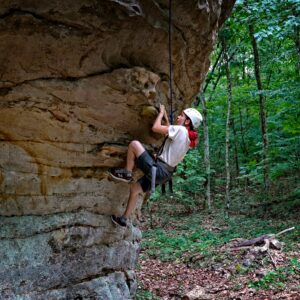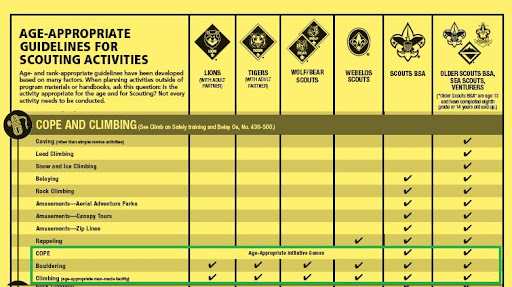C.O.P.E. & Climbing
Welcome to the home page for Climbing and COPE in the National Capital Area Council!
Our staff will work with your leaders to tailor a session specifically to your needs and abilities.
CLIMBING
NCAC Climbing ROCKS!
If you enjoy physical challenges and the outdoors our climbing program has something for you! Imagine standing at the bottom of a sheer cliff and thinking “That was a FUN climb! I’m going to do it again.” Climbing challenges a climber physically and mentally and strongly reinforces other Scouting outdoor activities including camping, geology, soil and water conservation and Leave No Trace.
The Climbing Committee provides training and support for units developing outdoor and indoor rock climbing activities. It’s easy to get started with climbing and the NCAC can support you through all interest and ability levels. We are here to help and mentor, learn together, and climb together.
Take Your Scouts Climbing
Make natural rock climbing a regular part of your outdoor program as half-day events or as part of larger unit or district activities. The Climbing Committee can provide trained instructors and gear for Scouts who want to enjoy top-roped climbs on local crags. Cub leaders can become Bouldering Facilitators to support close-to-the-ground climbing challenges. Contact NCAC.Climbing@gmail.com for more information.
Become a Climbing Instructor
Our climbing instructor training program provides youth and adults with training necessary to achieve the goals of the BSA climbing program. Our training fosters the same friendly, supportive environment we bring to youth programs, empowering qualified individuals to succeed and share the challenge, excitement and joy of rock climbing with BSA participants.
A Climbing Level 2 Instructor can organize and supervise unit, district and council climbing events and train Climbing Level 1 instructors. A Climbing Level 1 instructor can support a Climbing Level 2 instructor and provide ground-level training for Scouts and Scouters. Our climbing instructor training programs are offered in the spring and fall.
Become a Bouldering Facilitator
A Bouldering Facilitator helps Scouts enjoy the challenge of climbing close to the ground. Bouldering requires no specialized gear and is age-appropriate for all BSA members, Cubs included. The training usually takes about two hours and is offered on an as-needed basis. It is also a prerequisite for renting a council slackline kit.
More?
For additional information about NCAC climbing programs contact NCAC.Climbing@gmail.com and
visit NCAC Climbing Committee Resources.
You may be wondering “Besides bouldering, what does COPE and Climbing have for young Scouts that meets the Age-Appropriate Guidelines?” Quite a bit. We’ve highlighted the section.
Notice that COPE can be tailored for all ages and Cubs can climb on artificial surfaces. Like the Scouterhorn.
SCOUTERHORN
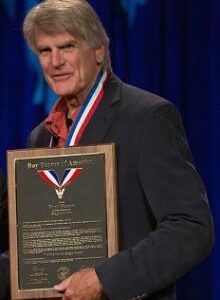
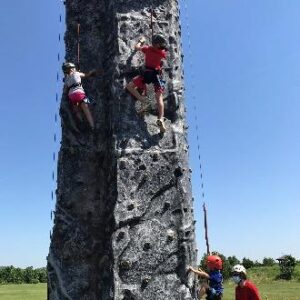 Scouterhorn: How did a 24 ft “Drop-a-Rock” mobile climbing tower get such a funky name?
Scouterhorn: How did a 24 ft “Drop-a-Rock” mobile climbing tower get such a funky name?
In the fall of 2014, Boyd Matson donated a Spectrum Sports mobile climbing tower to NCAC to help our climbing program. I’m told the powers-that-be were reluctant to accept the gift because NCAC did not have a means to tow it, so he also bought the “Captain America” truck! When Boyd was asked what he would like to call the tower, we are told his response was “The Scouterhorn, of course!” [We didn’t ask about the truck.]Boyd and his wife, Betty Hudson, attended the University of Scouting February 28, 2015. Boyd talked about how he discovered the joy of mountaineering and rock climbing as a Scout. He talked about hiking with his daughter to the top of Mount Kilimanjaro to watch the sunrise. He talked about how Scouting builds character and confidence through experience. It was a very moving presentation.
What’s in this for you?
Chances are, you are a Scout leader because you want to do things with and for your children and their friends. The Scouterhorn is a tool for helping them learn to deal with fear, that nasty little voice inside their heads telling them they’ll get hurt. The Scouterhorn has auto-belays—cables with independent hydraulic systems for each route—which automatically control the descent of a climber to the speed of a slow elevator. The perception of risk is high, but when rules and procedures are followed, the impact and likelihood of risk is very low.
Perhaps your District or Unit is holding a Join Scouting Night, a Camporee, or supporting a community event. If you have qualified staff, you could rent the Scouterhorn. The minimum staff is an adult lead instructor and at least one assistant instructor (at least 18 yoa). With only two staff, one or two climbers can be on the Scouterhorn at a time. If either staff member leaves, operation must stop. The more staff you have, more people can climb. The more training they’ve had, the more you can do (such as rappelling and simulated rock climbing).
If you are a leader of older Scouts, Venturers, or Sea Scouts, those youth can help with crowd control, helmeting, harnessing, coaching, and running all the operations within their level of training and ability. Your job as an adult leader would be to provide oversight and demonstrate to those who are not in Scouting how the Scouting program builds character.
Who can climb on the Scouterhorn?
 Age is no limit. It’s a matter of weight, gear, and grit. The Scouterhorn can handle climbers who are between 40 and 250 pounds, provided we have a helmet and harness that can fit snuggly. Then it’s a question of the climber being willing to try.
Age is no limit. It’s a matter of weight, gear, and grit. The Scouterhorn can handle climbers who are between 40 and 250 pounds, provided we have a helmet and harness that can fit snuggly. Then it’s a question of the climber being willing to try.
For the climber who is too short to reach the buzzer, missing the use of a limb, or lacking technical skills to climb, we have solutions. Those solutions require adults (or older youth) who will take the extra training and provide their time since a staff member can only support one climber at a time. Parents are also allowed to climb. With enough staff, we can set up routes so parents can coach alongside their children. I doubt a climbing gym would allow that.
What next?
Your next step is to sign up for training at https://scoutingevent.com/082-Scouterhorn_Operations_Training_2023. There’s an online portion and a hands-on assessment. If you have questions, please check the questions and answers about the Scouterhorn at https://www.magi-inc.com/Scouterhorn_Questions_and_Answers. If you still have questions, please email them to NCAC.COPE@gmail.com, or request a time we can chat.
When you’ve been trained, you’ll be able to rent the Scouterhorn.
COPE: Come for the fun; stay for life lessons
COPE stands for Challenging Outdoor Personal Experience. COPE is a program that offers fun activities like games, climbing, swinging, and balancing. These activities can be done alone or with a group. COPE is for people of all ages who want to challenge themselves and improve their skills. It’s not a competition, so everyone can succeed. COPE helps with things like leadership, problem solving, teamwork, and self-esteem. The goal is to have fun while learning and growing. After each activity, the team talks about what they learned and how they can do better. COPE is a great way to achieve personal goals and work well with others.
What’s the status of COPE?
At this time, NCAC has access to one COPE course, the COPE course at Goshen Scout Reservation. The course and the climbing tower get inspected to use them for summer camp, and to support the Family Campouts on Labor Day and Memorial Day. Due to challenges using Goshen off-season, neither the tower nor course are used otherwise.
Due to budget issues coupled with the Pandemic, the course at Camp WB Snyder, like many of the courses in surrounding councils, is not currently economically viable. We need to build a training program to train sufficient staff in order to offer programs. When we can offer programs, we should be able to bring in sufficient revenue to return to a time when we could use the high elements (requiring helmets, harnesses, ropes, and gear) and low elements.
What’s in this for you?
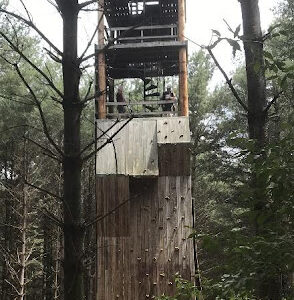 Chances are, you are a Scout
Chances are, you are a Scout  leader because you want to spend quality time with your children and use your training to help them and their friends. COPE are games with purposes. The stated purpose is given to the team as a challenge. The facilitator, the person giving the challenge, may have selected and tailored the game to achieve another purpose, such as enabling the team to realize they need to communicate. This is experiential learning; learning by doing, then reflecting on what occurred, why it occurred, and what needs to change. If you’ve attended Wood Badge, NYLT, or NAYL, you’ve participated in these games. There are many more of these. Perhaps you would like to learn more and practice facilitating.
leader because you want to spend quality time with your children and use your training to help them and their friends. COPE are games with purposes. The stated purpose is given to the team as a challenge. The facilitator, the person giving the challenge, may have selected and tailored the game to achieve another purpose, such as enabling the team to realize they need to communicate. This is experiential learning; learning by doing, then reflecting on what occurred, why it occurred, and what needs to change. If you’ve attended Wood Badge, NYLT, or NAYL, you’ve participated in these games. There are many more of these. Perhaps you would like to learn more and practice facilitating.
If you would like to know more about COPE, such as using COPE to get Dens, Patrols, Crews, or Ships to work as a team, please contact Tony Waisanen, NCAC.COPE@gmail.com or 202.810.5843.
NCAC Staff Advisor: Elisabeth Warren
